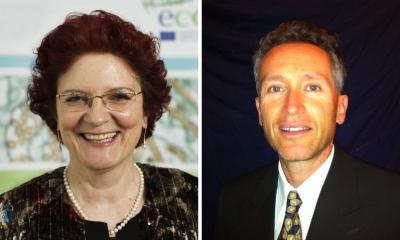Ebola
Reports of panic among medics
At the International Meeting on Emerging Diseases and Surveillance (IMED 2014), in Vienna, this year’s focus was on one particular emerging infectious disease: Ebola. According to the World Health Organisation (WHO), as of January 14th, more than 8.400 people have died of this dangerous disease and more than 21.000 cases were reported in nine countries.
Report: Michael Krassnitzer

‘This most serious Ebola outbreak ever was caused by social, geographic and political factors in the regions affected,’ says Belgian physician Hilde De Clerck MD, who works for the aid organisation Médecins sans frontières in the crisis regions. All severely affected countries are poor, have underdeveloped health systems, were involved in wars or armed conflicts in the past few years, and the people tend to mistrust government agencies and the countries mistrust each other.
De Clerck: ‘The epidemic started off slowly and spread quickly, affecting people from all walks of life. Lack of awareness about the disease, insufficient protection measures and the high degree of mobility of the people between three of the countries concerned – be it for business or family purposes – contributed to Ebola being able to spread.’ There is, however, good news: Oyewale Tomori DVM, PhD, President of the Nigerian Academy of Science, describes how Ebola was contained in his country. On 20 July 2014 a person from Liberia with acute Ebola symptoms arrived at Lagos International Airport. The preliminary diagnosis – Ebola – was confirmed by a private hospital. This index case had had contact with 72 people at the airport and in the hospital, who potentially were exposed to the virus.
The Ministry of Health and the Nigeria Centre for Disease Control (NCDC) declared an Ebola emergency. On 23 July the Ministry of Health, the regional government of Lagos and international partners set up an Ebola crisis intervention centre.
The index case died on 25 July 20. Subsequent Ebola infections were reported in Nigeria. All of them could be traced back to the index case. Close to 900 identified contact persons were monitored; eight patients died. On 20 October 2014, WHO officially declared Nigeria Ebola-free.
‘It is to a large extent due to the quickly established crisis intervention centre that we were able to successfully fight the disease,’ said Tomori. ‘We not only suffer from a real epidemic in West Africa, we are also suffering from an epidemic of fear that’s spreading all over the globe,’ said Dr Pamela Rendi-Wagner, Director of the Department of Public Health Services and Medical Affairs at the Austrian Federal Ministry of Health and adds, ‘Despite concerted efforts by all public health authorities it is difficult to counter the rising public panic’. In Austria it was reported that several health professionals quit their jobs because they feared having to care for Ebola patients. ‘It is our main task to listen to these fear-driven concerns and to inform and communicate widely, openly, early and in a transparent fashion in order to create trust,’ the health official emphasised.
Experts agree on one issue: they consider screening of in-coming travellers at international airports for Ebola to be useless, inter alia because usually people with an acute Ebola infection cannot travel. During the severe acute respiratory syndrome (SARS) pandemic, in 2002/2003, 45 million travellers were screened at airports – with only a single SARS case being identified.
It is much more important, according to the experts, to use the money for aid programmes right in the affected regions. ‘It is crucial to provide help where the epidemic broke out, that is in Western Africa,’ underlines Jack Woodall MA PhD, an epidemiologist from Brazil and vice-editor of ProMED-mail, the web-based Programme for Monitoring Emerging Diseases of the International Society for Infectious Diseases (ISID). He is confident: ‘We can stop the disease from spreading if we manage to break the chain of infection.’
20.01.2015







